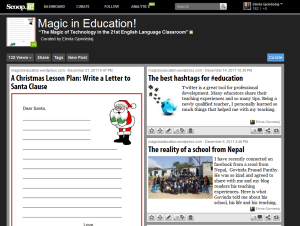Recently, I have decided to host in my blog a new page which is called ”Schools from Around the World”. I have been asking from teachers from all around the world to introduce education conditions in their country as well as their own teaching reflections in the country. Some weeks before I was lucky enough to gain a new friend: Govinda from Nepal. You can read his guest post here. This time, another friend, Yitzha Sarwono, shared her reality from Indonesia. I am inviting all of you to write a post about our teaching experience in your country.
Here is what Yitza shared with us:
Indonesia is a developing country consists of many islands with beautiful landscape and rich heritage. We are also very rich in term on culture. This diversity of course not only affecting the way we run our daily life but also in nurturing the young mind. Education in Indonesia comes in many kinds of form and way. From public schools, to the variety of private school. For those who live in big city, the options on finding the school that suitable for their needs are even wider. But for those who live outside the big city and in Remote Islands, education is still a luxury. Cause even when they don’t need to pay anything, to get to school isn’t an easy thing to do with the small number of school and teachers available there, not to mention conquering the nature just to get the knowledge since they usually have to travel miles to get to school. We actually have a program set by government and also independent organizations like Indonesia mengajar or Indonesia’s teaching (http://indonesiamengajar.org/) to settle the matter, but somehow with the population here, it is hard to reach all.
Public school is no doubt the 1st choice for almost everyone. Not only it provides the kind of education that is needed for everyone, here it is also free and filled with dedicated teachers. The only problem is that there’ll be so many students in one classroom that sometimes the teacher will find it hard to discover each student’s potential or help them 100% in reaching their goal.
Private school in Indonesia comes in many kinds and guarantees to fulfill each student’s needs. From a religion based school to nature school, homeschooling based school to Montessori school. Each offers prepared curriculum and experienced teachers. For people who are lucky enough to make a good fortune, they will surely choose Private schools as the number of students in each class aren’t as many as in public school and they can choose the one that is suitable for their needs.
But whether you go to public school or Private school, one thing for sure though, the final exam is conducted by the government and English is taught in every school.
I currently work in a Montessori Kindergarten based school. All lessons here are presented in English. And because we run our own curriculum, we can make sure that what we teach in the classroom has everything our students need in order to achieve our goal. Of course we try to keep it up to the national standard of Indonesia’s education which is for our students to be able to read and write when they start their primary school. It is quite hard sometimes and demanding as parents expects so much from us, being the private school with high tuition. But good thing that we don’t have a lot of students in the classroom (the most is 10 for my school), so all teachers can try their best to make it happened.
But being a teacher in Montessori school does give me a lot of new experiences. Not only because here we have different method than most school, we are also equipped with our own learning tools that we ought to mastered in order to teach them properly. And I am very fortunate that my school provides weekly, monthly and term training to all teachers. That is our way to make sure that we got what it takes to bring our students to their best and at the same time, expanding our ability as teachers.
To reflect about how I started of as a teacher, we have to go way back in my junior high school’s time. I was offered to tutor my classmates in refining their English, since I was doing kind of okay there. And I just knew it from the start that I love sharing! I’m a blabber, I love talking and I can go on telling things for hours and hours! So I thought, why not put that ‘quality’ of mine to a good use; Teaching!
I started as an English teacher professionally back in 2001. Later in 2008, I began to be drawn by early childhood education, merely because I believe that the young learners are pure like a new paper, ready to be written on. So I was so eager on playing the part of preparing them with a godd basic. Didn’t somebody say that everything we know, we learnt it in Kindergarten? 😉 So here I am now. And I have always been so blessed by the opportunity to work in good places where I could not only experience great things and share my knowledge but also the chance of growing as a person and educator. And that is why I am also so moved to be involved in many things in hope that I could inspire young people in Indonesia to also be teachers, since we still need plenty of them, especially in remote area. And I’d love to thank Elinda for giving me the chance to introduce you guys to my country, Indonesia. Thanks so much, and as I always say : “aza aza fighting!”
This slideshow requires JavaScript.
Thank you so much my dear Icha!!
There is an open intvitation for everyone who wants to share the teaching conditions and experiences from his/her country. Do not hesitate to contact me here.
37.979180
23.716647
 Bee Clip is a new Web 2.0 app that gives the student the potential to create their own online scrapbooks, online portofolios, collages, moodboards and for many other ways. The user can add images, videos and texts and also can share the scrapbooks online or print a hard copy. It is free and you can try it without the need to register. I really like this Web 2.0 app and I am going to use it for some project work with my students.
Bee Clip is a new Web 2.0 app that gives the student the potential to create their own online scrapbooks, online portofolios, collages, moodboards and for many other ways. The user can add images, videos and texts and also can share the scrapbooks online or print a hard copy. It is free and you can try it without the need to register. I really like this Web 2.0 app and I am going to use it for some project work with my students.
 I have recently came across to a wonderful Web 2.0 Tool that can motivate your students to write wider texts in English. This tool is
I have recently came across to a wonderful Web 2.0 Tool that can motivate your students to write wider texts in English. This tool is 



